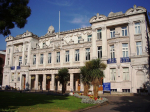
About 200 Afghan special forces members, trained and supported by the UK, are confronting imminent deportation to Taliban-controlled Afghanistan, uncovering what a former UK general
labels a "betrayal" and a "shameful" act.
These soldiers sought refuge in Pakistan, but now face expulsion as the Pakistani authorities aim to remove Afghan refugees. Despite the UK's claims of bringing numerous Afghans to safety, the fate of these elite soldiers remains uncertain, drawing condemnation from military figures and veterans.
Gen Sir Richard Barrons, who served in Afghanistan for over a decade, slammed the UK's failure to relocate these soldiers, calling it a "betrayal" with potentially fatal consequences for those who served alongside British forces.
Earlier pledges by Prime Minister Boris Johnson to ensure "safe passage" for Afghan special forces have not materialized. Additionally, calls from senior British diplomatic and military figures to grant asylum to Afghan civilian leaders who collaborated with the UK were dismissed.
The Afghan Relocations and Assistance Programme (ARAP) has rejected many applications from these soldiers and civilian leaders, leaving them in limbo or facing outright refusals after lengthy waits.
One of the Afghan special forces members, known as "Ali," expressed feeling abandoned and betrayed by the UK, recalling years of joint efforts and risking their lives alongside British troops. Despite their loyalty, these soldiers and civilian leaders have been disregarded and left vulnerable to deportation and persecution.
Similarly, Mohammad Fahim, a key figure in the fight against the Taliban, recounted his struggles and sacrifices, only to face rejection by the ARAP scheme, leaving him in hiding in a neighboring country with an expired visa and dwindling options.
The decision to reject these individuals by ARAP, despite their close collaboration and sacrifices made alongside British forces, has triggered outrage and condemnation. Gen Sir Richard Barrons expressed deep shame over the UK's failure to fulfill its commitment, questioning the efficacy and fairness of the ARAP scheme's criteria.
The Ministry of Defence defended its actions, highlighting the considerable number of individuals brought to safety but emphasized individual assessments for ARAP applications.
Despite the heartbreak and feelings of betrayal, Ali and Mr. Fahim expressed pride in their work with UK forces but remained disillusioned by the broken promises and rejection they faced in their time of dire need. Photo by davric, Wikimedia commons.







































